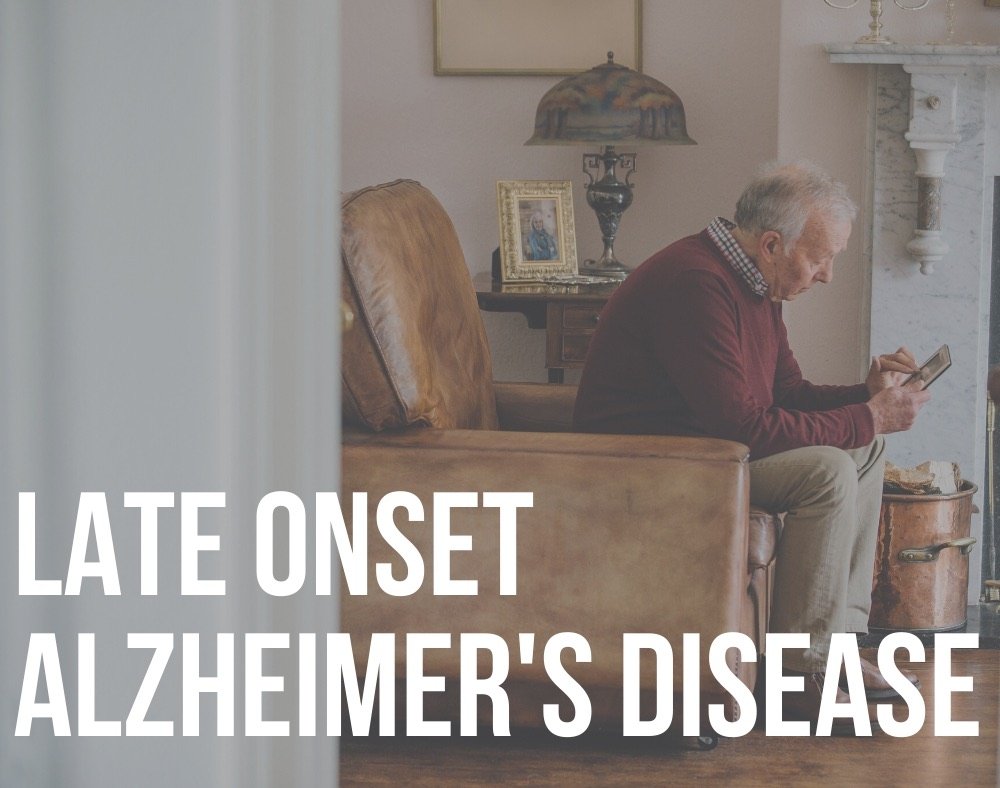It is known that late onset Alzheimer’s disease is the most common one in older adults.
But first, let’s take a look at the bigger picture, causes, factors, symptoms and treatments of Alzheimer’s disease.
Different people develop Alzheimer’s disease (AD) at different stages in their lives. For some, a positive diagnosis happens before they turn 65 years, which is mostly in their 40s or 50s.
This is known as early-onset Alzheimer’s.
Others, on the other hand, will get the disease when they are 65 years or older. This is known as late onset Alzheimer’s, and it is the most common form of the illness responsible for about 90% of Alzheimer’s cases.
The irreversible disease is a leading cause of death in seniors behind heart disease and cancer.
Let’s explore this illness in detail below.
Causes of Late Onset Alzheimer’s disease

To date, scientists and other parties involved have not been able to pinpoint the exact cause of this illness.
The question of why some individuals get it and others do not remain a mystery.
Researchers have not yet identified a particular gene that is behind the development of Alzheimer’s.
While some say that Alzheimer’s is hereditary, the fact cannot be substantiated because it may or may not run in the family.
There are instances where both parents may get the illness and their child does not end up getting it.
What factors are behind the development of the disease?

Experts agree that Alzheimer’s is likely not the result of a single cause, but a combination of environmental, genetic, and lifestyle factors.
For instance, a mutation of the ApoE gene is believed to increase the risk of developing Alzheimer’s after hitting 65 years.
Conversely, it is not the cause of the illness. The National Institutes of Health states that ApoE is responsible for how cholesterol moves in the blood.
Some studies suggest that individuals who have high cholesterol levels and high blood pressure are at a higher risk of developing Alzheimer’s.
Recent research also suggests that viral and bacterial infections play a significant role in the development of the illness.
Because of ongoing research, scientists are positive that soon they will be able to come up with a detailed explanation of the multiple Alzheimer’s causes so that people can have a better understanding of this disease.
Symptoms of Late Onset Alzheimer’s disease

AD affects people in different ways.
The most common symptom pattern, however, usually starts with continuing challenges in remembering new information.
This happens because the neurological disorder affects the hippocampus, which is the part of the brain that is responsible for memory and learning.
Other warning signs
Other warning signs of this disease include:
- Repeating statements and questions
- Having a hard time making decisions
- Issues with visuospatial skills like judging distances
- Communication problems
- Inability to complete daily living activities like eating, walking, dressing, and maintaining personal hygiene
- Hallucinations and delusions especially in the later stages
- Misplacing items
- Confusion of place or time
- Changes in personality such as becoming anti-social, anxious, depressed, aggressive, etc.
Symptoms of Alzheimer’s (late onset) typically begin to show when a person is in their mid-60s.
Because Alzheimer’s is a progressive disease, the symptoms become worse as the neurological deterioration progresses.
During the later stages of the disease, the affected person may have to get into 24/7 care because they are not able to live independently.
Alzheimer’s disease Diagnosis

Experts are continually working on techniques to identify the earliest stages of Alzheimer’s in a bid to offer early intervention effectively.
This, in turn, helps to delay significant impairments.
For the longest time, a thorough post-mortem microscopic brain examination was the definitive way to diagnose Alzheimer’s.
This was not helping too much because the diagnosis needs to be made when a person is alive.
What’s necessary for AD diagnosis
Nowadays, experts can diagnose AD with over 95% accuracy in living humans.
A combination of tools come into play including:
- A person’s medical history plus that of their families
- Neuropsychologic tests to assess cognitive function
- Multiple laboratory tests: medics usually conduct this to identify secondary causes of the illness such as medical conditions that are common with golden-agers. These might include blood count, glucose levels, serum electrolytes, Vitamin B12 Hepatic function panels, creatinine ration, and so forth.
- Neuroimaging: this helps to table appropriate details on brain structures to help exclude treatable conditions
The list above is not exhaustive but covers the most essential AD diagnosis tools.
Because people experience the illness differently, a doctor may prescribe more tests to conduct the diagnosis comprehensively.
In regards to diagnosis for late onset Alzheimer’s, it is important to note that misdiagnosis is bound to happen in some cases.
This is because the illness shares symptoms with other medical disorders. It is the reason it is crucial to get a proper diagnosis to manage the disease better.
Treatment for Late Onset Alzheimer’s disease

Despite ongoing research and studies, experts have not come up with a cure for AD. This does not mean that a positive diagnosis implies suffering and immediate death.
People who have this illness can live up to 8 years or more after the development of the disease. A couple of factors can affect longevity such as:
1. Gender
Many studies suggest that women live longer than men after Alzheimer’s diagnosis.
2. Brain abnormalities
Persons who have a combination of Alzheimer’s, brain, and spinal cord issues tend to die faster than those who do not have all these medical conditions.
The same applies to other health problems where individuals with diabetes or heart attacks have shorter lifespans than people who do not have other complicating health factors.
3. The severity of symptoms
Persons who have severe motor impairment like tendencies to get lost or wander and falls tend to have shorter life experiences.
Several coping mechanisms are put in place to help individuals with the disease live fuller, more independent, and satisfying lives for the longest possible time like:
Use of Medication

Certain medicines are available to help reduce symptoms of Alzheimer’s temporarily such as:
AChE inhibitors
Acetylcholinesterase are drugs that help to increase acetylcholine levels in the brain. This is a substance that helps to improve communication between nerve cells.
Only specialists like neurologists or psychiatrists can prescribe the drugs.
A general GP can also do it but it has to be under the direction of the specialists.
Most recent guidelines recommend that the people who should take the medicines are the ones in the middle or severe stages of the illness.
Persons on these medications need to be aware of some side effects they may experience.
The most common ones include loss of appetite, nausea, and vomiting. For most people, side effects get better after some time of taking the medication.
Memantine
This is a drug that has been designed to block the effects of excess glutamate a chemical in the brain. Persons can use this for moderate and severe Alzheimer’s.
It comes in handy for individuals who cannot tolerate AChE inhibitors.
Additionally, people who are on AChE inhibitors can also take the drugs. The known side effects of these medications include temporary constipation, headaches, and dizziness.
To get more fine points about the side effects, consult a professional or doctor for an individual consultancy.
Physicians might also prescribe other medicines like antidepressants that can help deal with behavioral changes.
Therapies

Treatment can also involve different types of therapies that are beneficial when caring for a person with Alzheimer’s. These can include:
Cognitive rehabilitation
This is where the ill person works closely with an occupational therapist or any other professional to achieve a personal goal.
This can be anything from learning how to use a phone, computer, or completing a daily task.
This rehabilitation aims at getting the parts of the brain that are working to assist the ones that are not functioning as they should.
Reminiscence
This involves talking about events and things from a person’s past.
The use of props such as music, photos, and other possessions, can make this exercise more productive.
You can combine this with life story works that involve a collection of notes, photographs, and keepsakes from the suffering individual’s childhood through old age.
Studies show that these are effective when coping with late onset Alzheimer’s because it helps to enhance good mood and wellbeing.
Preventing Late Onset Alzheimer’s

Similar to the cure situation of Alzheimer’s, there is still no sure way of preventing the development of the disease.
Experts continue to conduct multiple studies on preventive measures, but the results are usually inconsistent.
However, several lifestyle factors might help to reduce the risk of the illness, such as:
Diet
Studies suggest that earing right might help keep the disease away.
You should purpose to always indulge in a balanced diet that mainly constitutes fruits, vegetables, healthy fats, and whole grains.
Physical Movement
Evidence puts forward the benefits of exercise for the brain, which may help reduce the risk of suffering from progressive disease.
Intellectual activities
Research suggests that exercising the brain through activities like writing, reading, playing games, and doing puzzles help stimulate the brain health.
Anyone who has Alzheimer’s must consult a healthcare professional first before making any key lifestyle change to be on the safe side.
Closing Remarks
More elderly people are getting a positive diagnosis of late onset Alzheimer’s disease. Management of the illness is quite complex because there is no cure.
There is a need for a comprehensive care approach that not only focuses on the person with the disease but caregivers as well.
Early diagnosis is beneficial because affected individuals can then work closely with their relatives and doctors to lead fuller and more gratifying lives.
Sadly, it may reach a point where persons with Alzheimer’s may need to move to care facilities or have professional caregivers at their beck and call at home.

